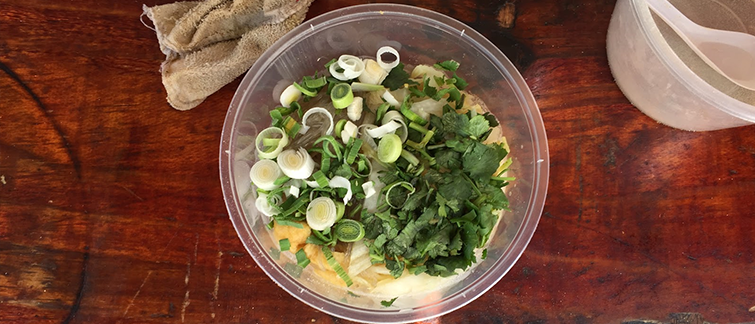Huai Nan Niu Rou Tang (淮南牛肉汤) is a special dish from the Anhui region (East of China, Northern part of Anhui) which takes over 5h to prepare. It is based on the special tasty beef broth and then noodles and other toppings are added. The dish costs 12 kuai (14 if you want a boiled egg added).
Ingredients:
Soup: Beef, garlic, Chinese herbs, water, oil, ginger, anis, salt.
Toppings: noodles (either rice noodles or sweet potato noodles), crushed chilly sauce, cilantro, shallot, caraway, vinegar and an optional boiled egg.
Cooking Methods:
The broth takes about 5 hours to prepare. The beef is cooked and then soaked in water with ginger anis and salt to absorb the flavors.
Once it’s ready, the soup is poured in a large metal container where then separately a ladle is added with the chosen noodles. It takes one minute for the noodles to cook. Once it’s done, a spoonful of a “mysterious powder” is added to the base of the bowl. Then the cooked noodles are placed in the bowl, with the caraway on top, the cilantro and shallot and a vinegar drip. To top it, you add a spoonful of the chilly crushed sauce, and then the final touch: the bowl is filled up with the tasty huai nan beef meat soup!
History:
There are divided theories as to where this dish originates from. Some believe this dish originates from either the nomadic Song or Yuan Dynasty people, others believe Wangan Liu to be the pioneer but it is also presumed that Kuangyin Zhao was the first. In《淮南子·齐俗训》(Huai Nan Zi Qi Su Xun), there is this account of the preparation: “今屠牛而烹其肉,或以为酸,或以为甘,煎熬燎炙,齐味万方,其本一牛之体。” which means that from the same cow meat one can obtain different flavours, such as sweet or sour, by different cooking methods. This dish is now one of the most traditional and authentic foods in the Anhui province and there are a good number of street food vendors who cook a delicious and authentic version of it for a good price.
Possible Variations:
Noodle Type- rice noodle (mi fen) or sweet potato noodle (hong shu fen)
Optional boiled egg added at the end
